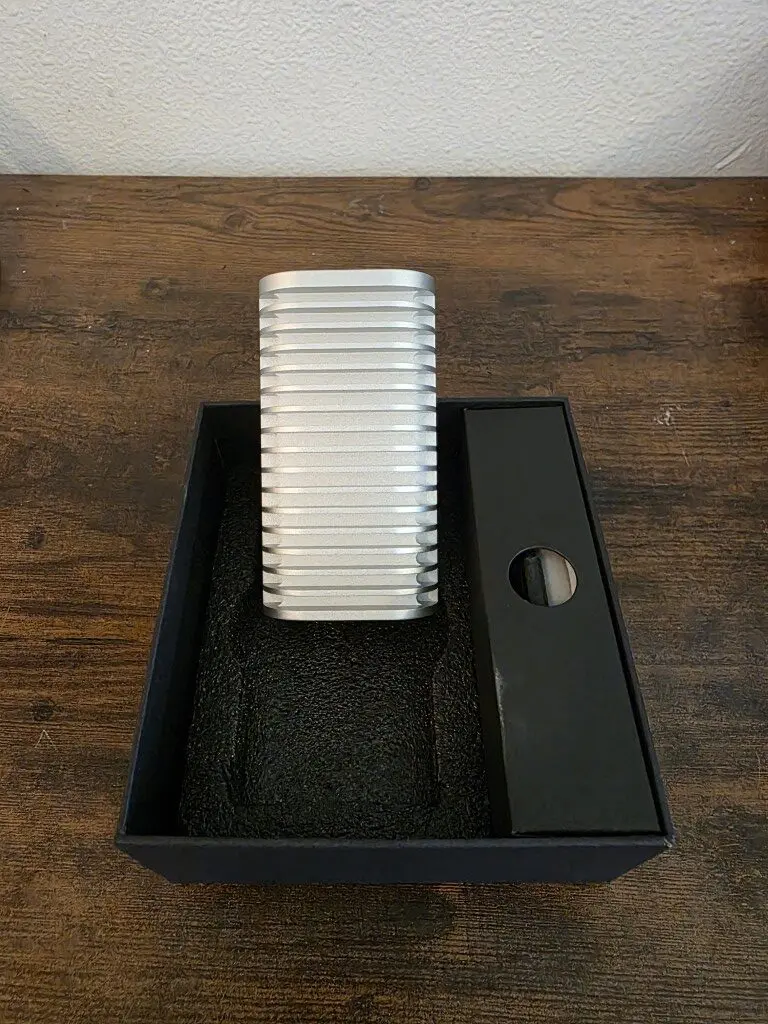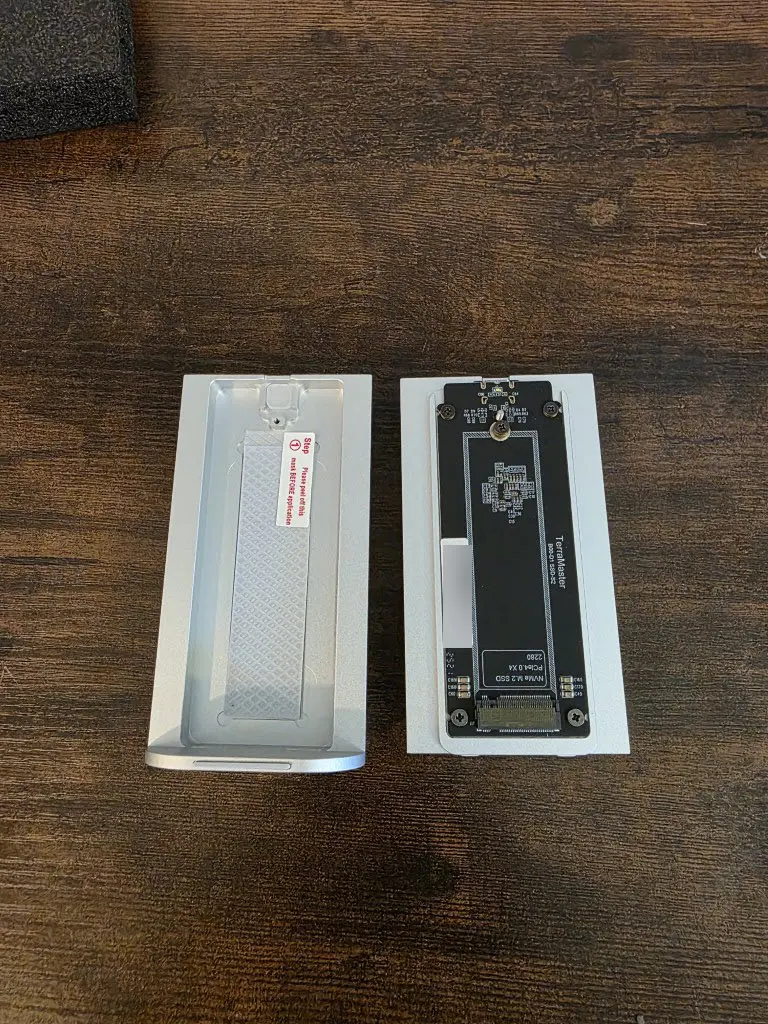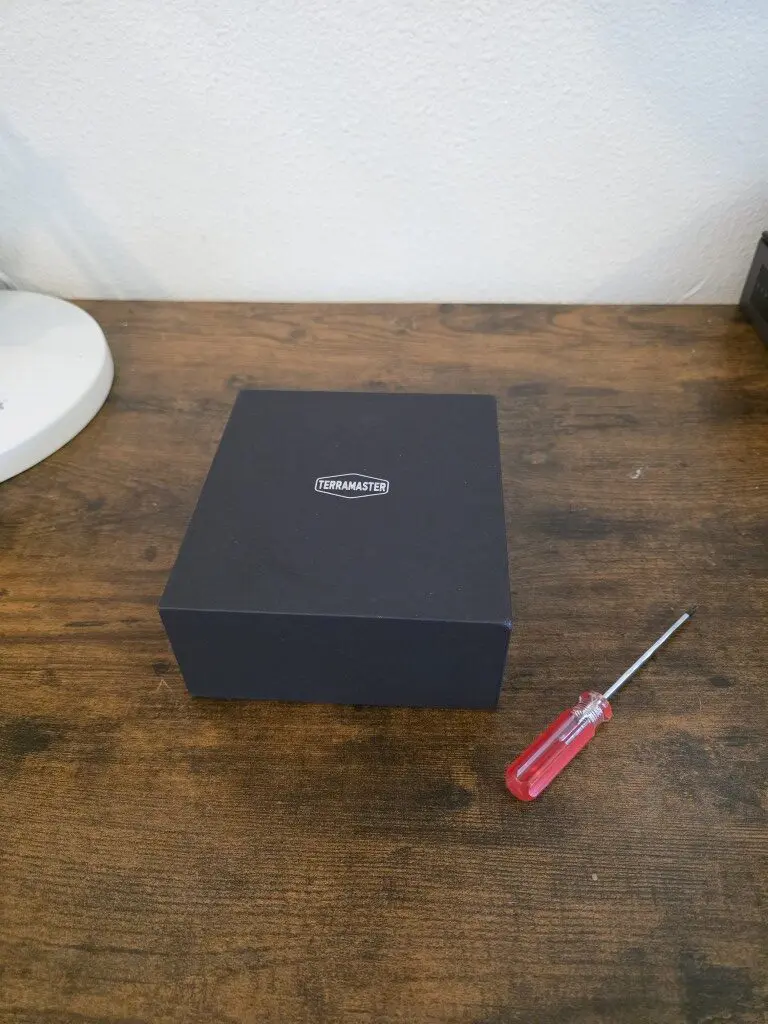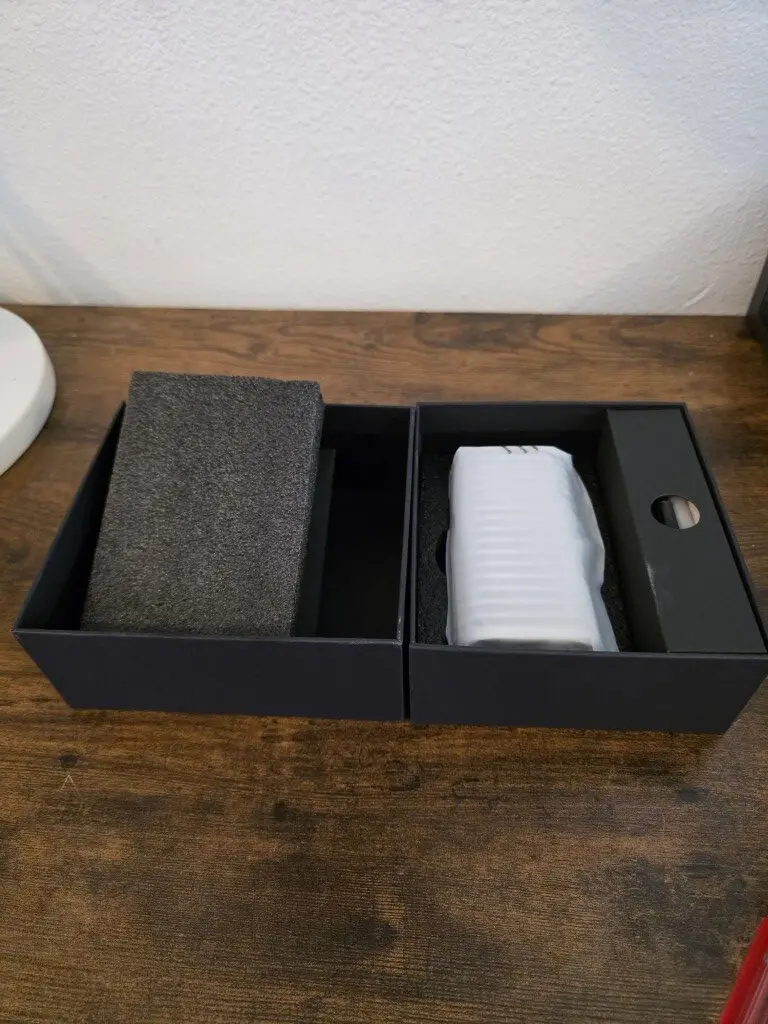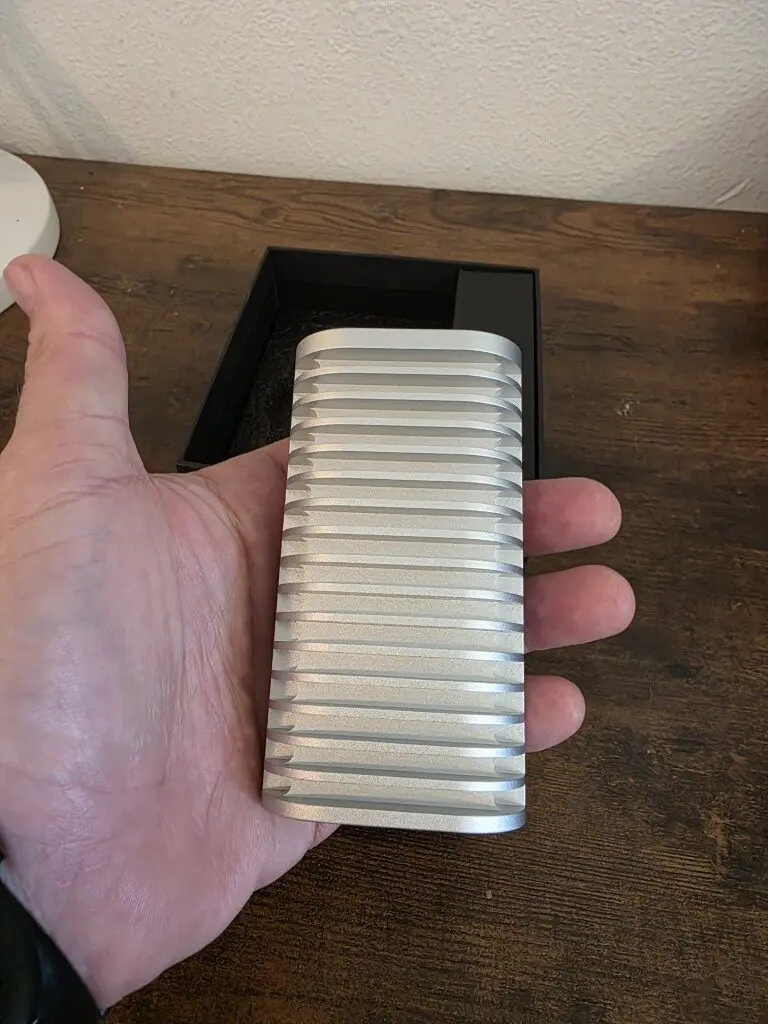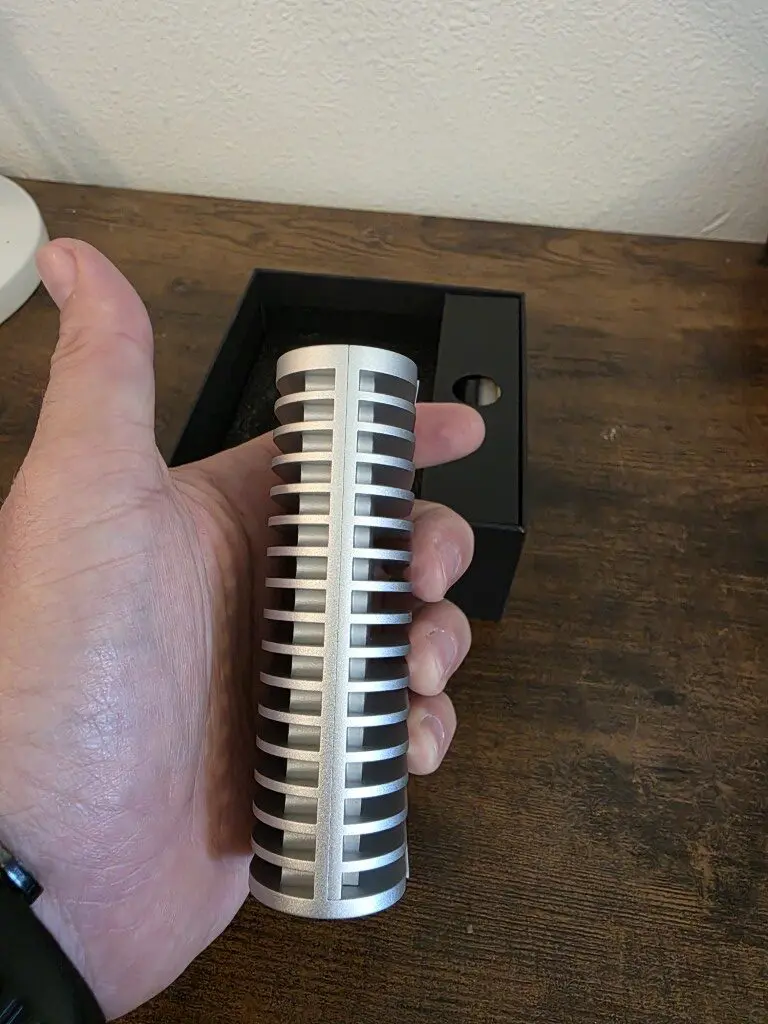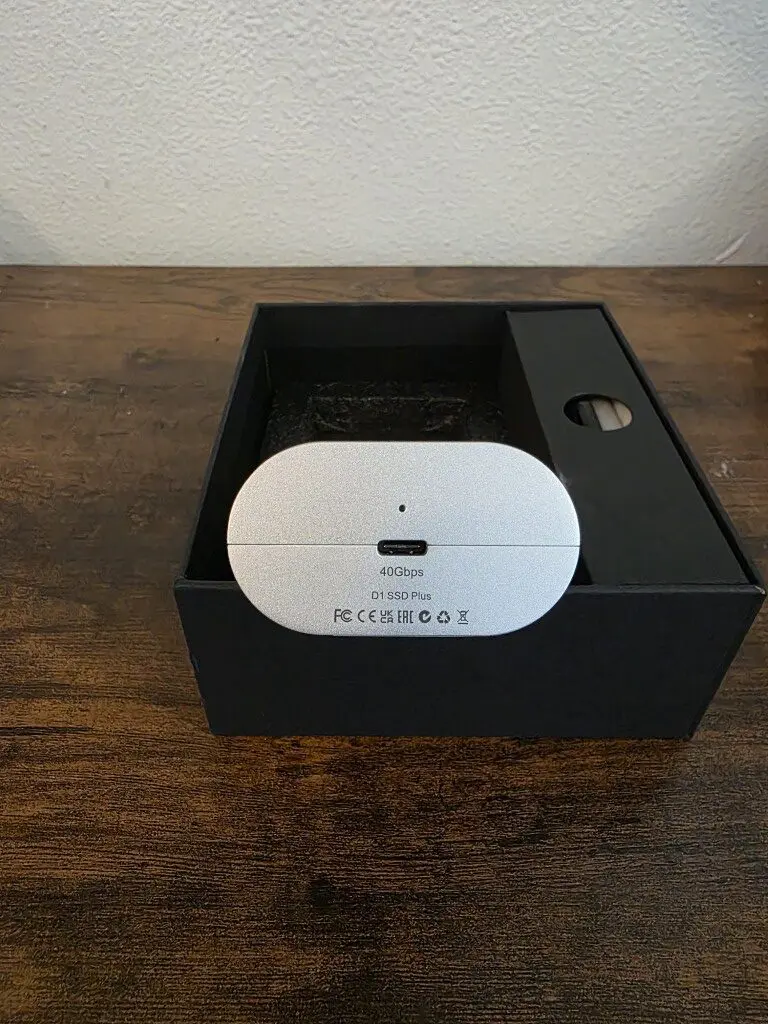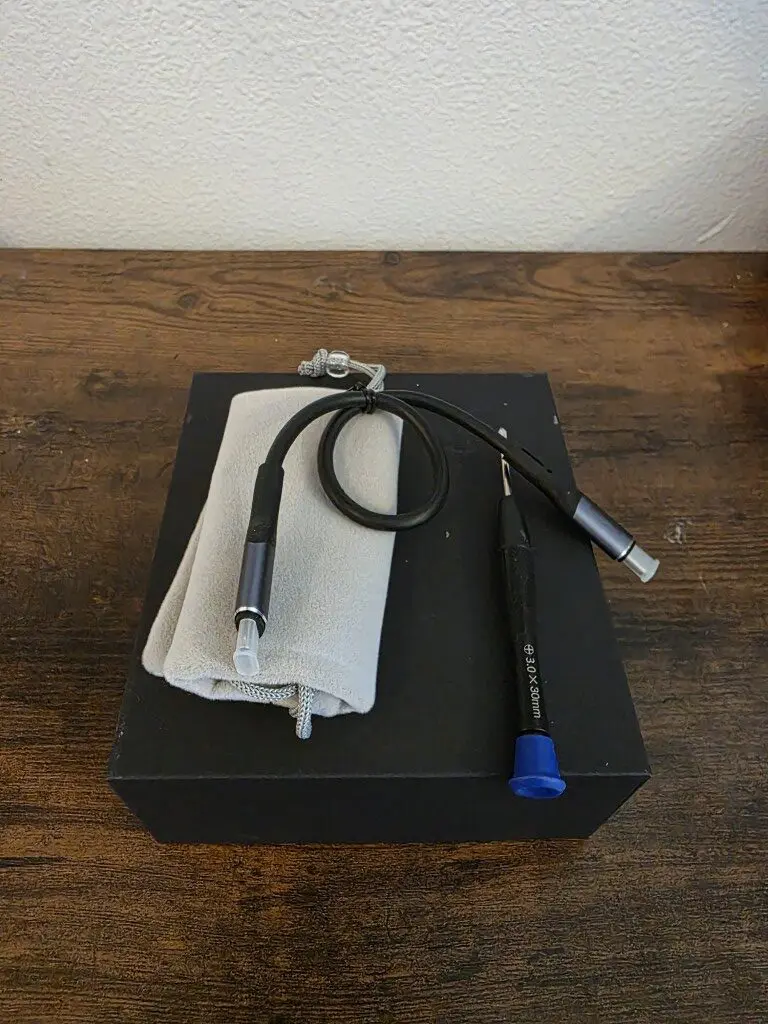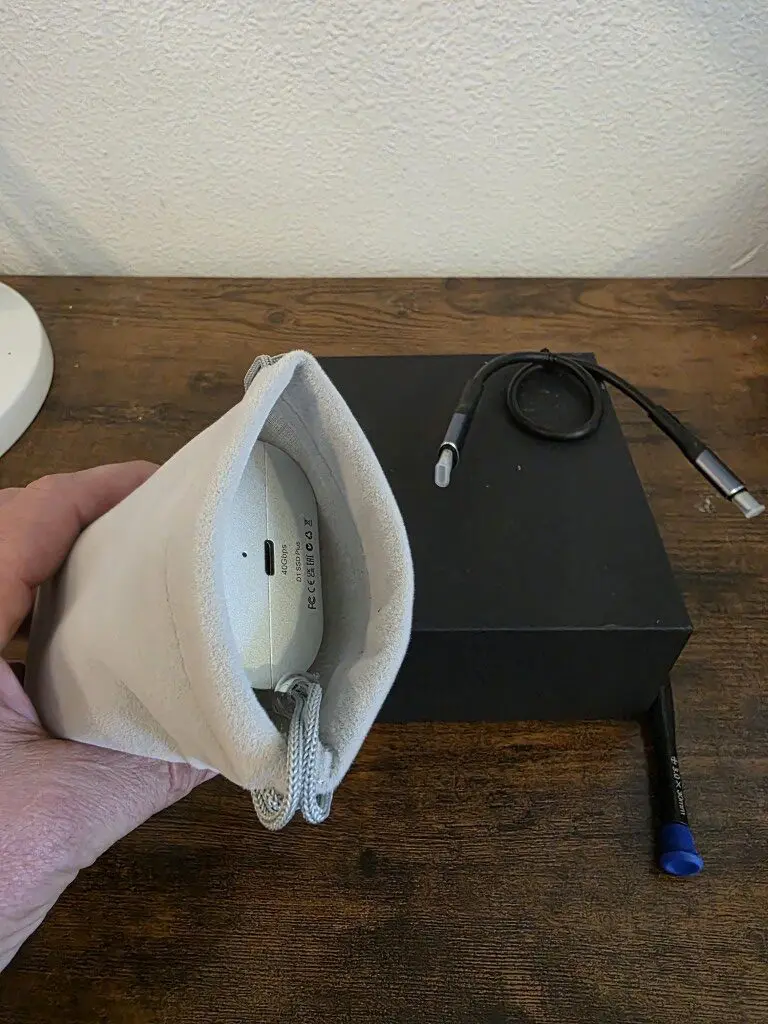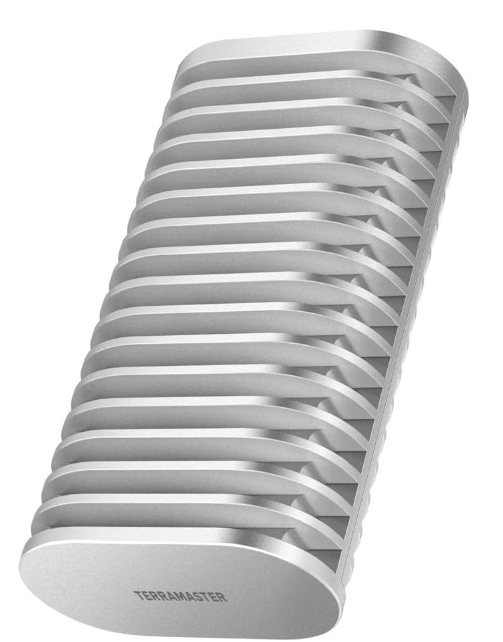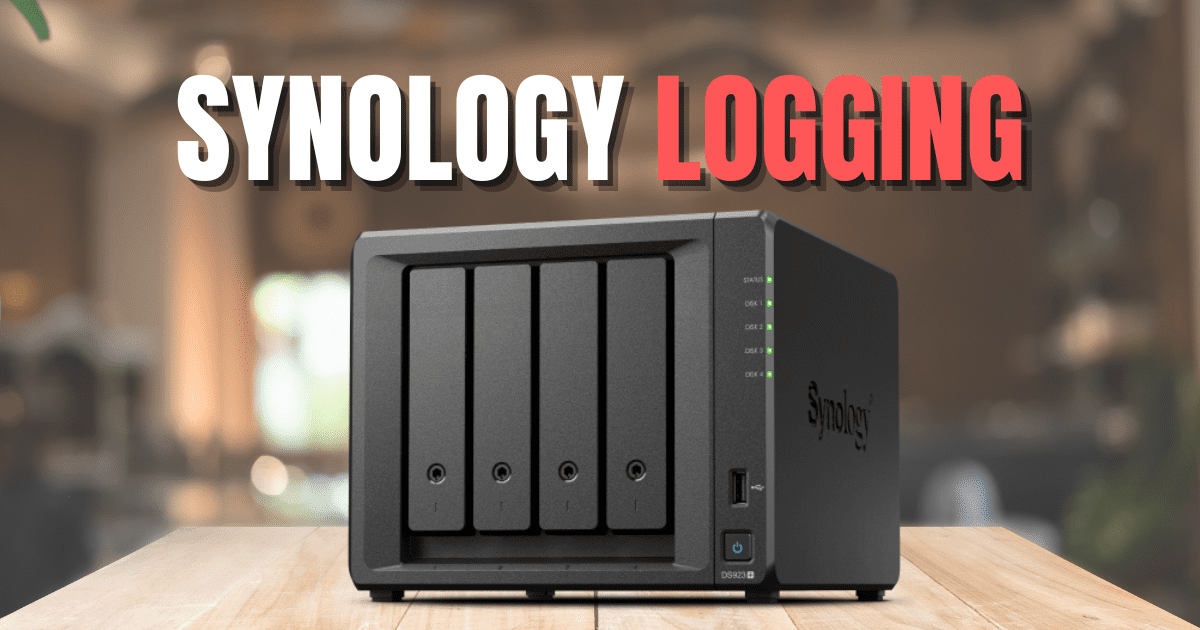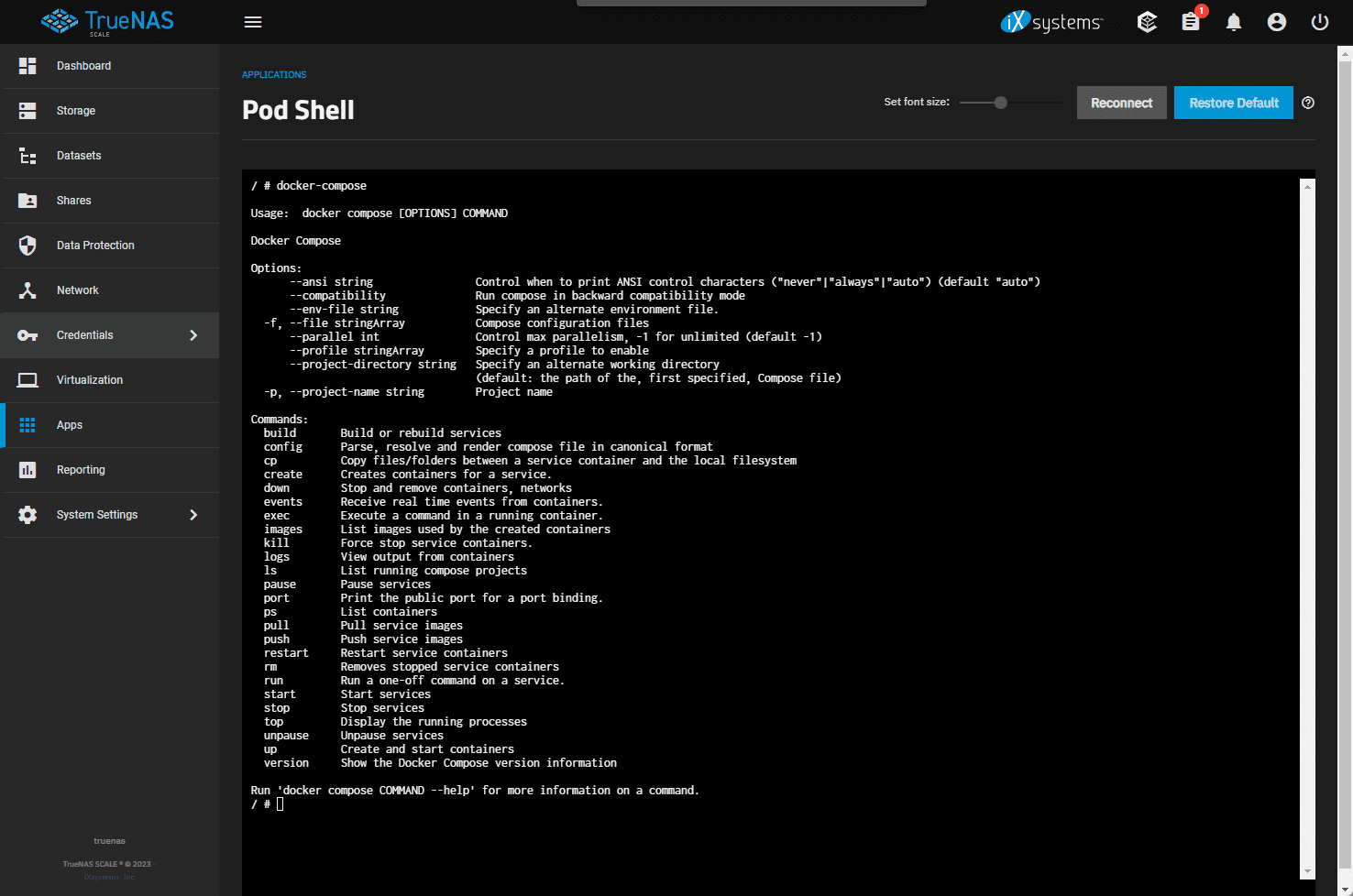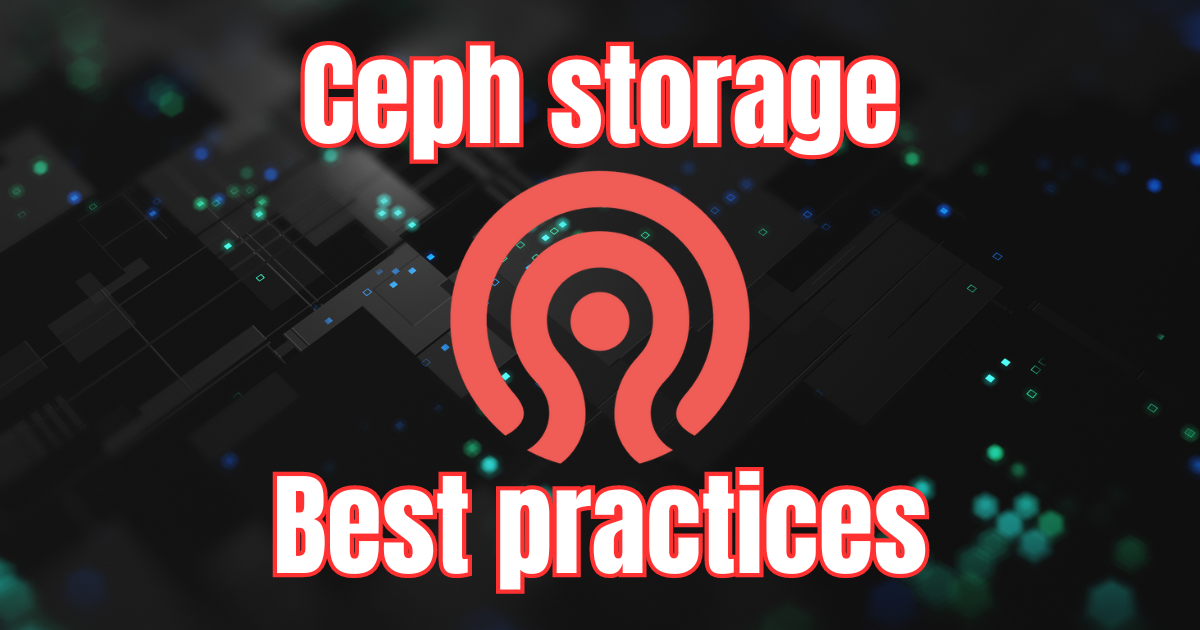The portable SSD market has exploded in recent years. When Terramaster sent over the D1 SSD Plus for me to take a look at, it was an intriguing little device to say the least and one that piqued my interest. This is a specially suited device that is designed for creators and others who may need a VERY fast portable drive to take with them. Especially if you are someone who may be editing 8K footage or a home lab builder who is moving virtual machines between hosts, the D1 SSD Plus has a lot to offer. Let’s take a look at my review of this unit and whether it is something that you should buy.
Design and build quality
I think the design of this little portable SSD unit is very cool. The housing is made from aerospace-grade aluminum that is CNC machined. I really like the fact this little USB4 device is not enclosed in flimsy plastic like I have seen in others. This chassis feels dense, rugged and is definitely something that you know will protect the drive that is housed inside.
Terramaster has also added shock-absorbing rubber feet that will keep it from sliding on desktops or in mobile setups. This will help to avoid any accidental slips when in use.
Also, the way the aluminum housing is designed definitely helps with heat dissipation. It has a triple-area of heat dissipation system that maintains temperatures according to Terramaster’s numbers between 36°C and 44°C under full load. And, what’s more this is a win/win because with passive cooling that is this efficient it is totally silent. This makes it a great use case for those in creative studios or offices where environmental noise matters.
Because it’s completely fanless, cooling is handled through a triple-area heat dissipation system built directly into the body. TerraMaster claims the enclosure maintains temperatures between —and because it’s all passive, it runs in total silence. That makes it perfect for use in creative studios, offices, or any environment where noise matters.
At 112.5 × 60 × 33 mm and 246 grams, it’s also compact. You can easily carry it in a laptop bag, and since it is substantial in its build quality you won’t worry about the normal bumping around experienced when carrying a bag around.
Performance and speed
This is where the Terramaster D1 SSD Plus shines. It features 40 Gpbs connectivity. This means that you can achieve real-world speeds of:
- 3853 MB/s reads
- 3707 MB/s writes
Those numbers are tested with a Samsung 990 Pro 4 TB SSD on a Mac Mini M4 Pro. That means you could transfer a 3 GB file in just one second. Very cool!
So in practical real-world daily performance, it means 4K and even 8K video editing can be done straight from the drive without stuttering. Large RAW photo libraries or machine learning datasets will load instantly. Gamers can also keep their entire game library on the drive and have lightning fast load times.
In practical terms, this means 4K and even 8K video editing can be done straight off the drive without stutter. Large RAW photo libraries or machine learning datasets load instantly. Gamers can keep their entire game library on the drive and enjoy lightning-fast load times.
Capacity and compatibility
Inside the D1 SSD Plus it supports a single NVMe PCIe M.2 2280 SSD up to 8 TB max. However, that is likely plenty of space for even heavy creative projects or lab data. As for file systems that are supported, you can load it up with:
- NTFS
- APFS
- exFAT
- FAT32
- EXT4
There is a small Philips head screw on one side of the unit that you unscrew and it releases the unit so that it breaks in half to reveal the internal NVMe M.2 slot.
You can do things like boot macOS as a startup drive. This might make it attractive for Mac mini of MacBook owners who are looking to expand their storage without paying Apples markup for internal SSDs.
As for backwards compatibility, it supports Thunderbolt 5/4/3 and legacy USB standards. It also works across Macs, Windows PCs, Linux, and consoles like the PS5 and Xbox Series X/S. So if you don’t have the latest USB4 ports it is still supported at lower speeds.
In case you are wondering, Windows 11 had no problems detecting the drive without issue. This Windows machine as well doesn’t have USB-4 ports, so this was a good test of backwards compatibility and just general compatibility without drivers, etc.
In case you are wondering, the NVMe drive I quickly popped in was from a mini PC that I had been testing with so it had Windows installed on it (so this is why you see the partitions).

Unboxing
Terrmaster does a good job with packaging. I have had good experiences with other NAS devices of theirs. The D1 SSD Plus came packaged very well.
After removing the top lid to reveal the unit.
After taking it out and removing the plastic, you get a feel for the size of the unit in my hand.
A view from the side.
At the end of the unit, you see the 40Gbps USB-4 port.
Accessories and what it comes with
In case you are wondering what it comes with. Below is a view of the “goodie bag” compartment in the packaging. You get a nice cloth bag to store the unit as well as a screwdriver for removing the screw to gain entry to install your NVMe drive, and a high quality (but short) USB-C cable that is rated at USB-4 speeds.
After putting the Terramaster D1 SSD Plus in the cloth bag.
Using it for backups
TerraMaster says the D1 SSD Plus can act as a backup hub with TerraMaster’s included apps:
- TDAS mobile app for iOS/Android lets you quickly back up photos and videos.
- TPC Backupper for Windows provides scheduled system and file backups.
That makes it useful for mobile professionals who need fast storage and backups on the go. Also, in the home lab, if you need quick and easy backups, you can keep this in mind as a backup target for your machines and mobile devices.
Quiet and reliable for daily use
Noise is often overlooked in portable storage, but TerraMaster engineered the D1 SSD Plus for discreet operation. The micro-pore LED indicator avoids harsh light pollution in dark studios, while the fanless cooling ensures a zero-noise experience.
Power draw is modest: 7.5 W under load, and 5.5 W in hibernation, so it won’t strain your laptop battery during field use.
Home lab use cases
While the D1 SSD Plus is marketed for the creative professionals crowd, I think it also has good features for home lab builders too. If you’re running Proxmox, VMware, or a Kubernetes cluster, you know how often you need to move large datasets, ISOs, or backups around. This enclosure would allow you to move files around quickly if you have USB-4 ports.
But there are other use cases I can think of:
- Portable VM/ISO library – Keep ISOs and VM templates on the drive and move them between lab hosts at USB4 speeds
- Backup target for single hosts – Point Proxmox Backup Server, Nakivo, or Veeam agents at the D1 as a fast drive for lab snapshots and backups
- Sneakernet for clusters – If you manage multiple clusters or have gear in different locations, the D1 is perfect for moving ;arge VM images or container volumes physically
- Scratch/cache drive – In Proxmox or Linux experiments, it can serve as a temporary ZFS cache tier or a scratch disk for databases
So, I think for home labbers, the D1 SSD Plus is like having a pocket-sized high-speed NAS without the challenges of network bottlenecks.
Price and buy link
Right now on Amazon you can get this for $109.99 but they also have an $11.00 coupon you can clip that makes this a really good deal for $98.99.
https://geni.us/FIp1ktl (My Amazon affiliate link – thank you for your support!)
Pros and Cons
Pros
- Fast USB4 40 Gbps speeds (~4 GB/s)
- Good build quality with CNC-machined aluminum body
- It is silent, being fanless but still keeps cool temps
- Up to 8 TB NVMe capacity
- Works with Windows, macOS, Linux, iOS, Android, and consoles
- Backup support with Terramaster apps
- $98 right now with coupon
Cons
- You supply your own NVMe SSD (extra cost but this is common across vendors)
- Heavier than slimline enclosures
- Peak performance depends on SSD and host system (but this is true of any device like this)
- No RAID or dual-disk support, single disk only
TerraMaster D1 SSD Plus vs Competitors with similar products
| Feature | TerraMaster D1 SSD Plus | Samsung T9 Portable SSD | Sabrent Thunderbolt 3/USB4 NVMe Enclosure |
|---|---|---|---|
| Interface | USB4 40 Gbps (backward-compatible with Thunderbolt 5/4/3 & USB 3.x/2.0) | USB 3.2 Gen 2×2 (20 Gbps) | Thunderbolt 3 (40 Gbps) & USB4 |
| Max Speeds | 3853 MB/s Read / 3707 MB/s Write (with Samsung 990 Pro) | Up to ~2000 MB/s | ~2700–3000 MB/s (depends on SSD & host) |
| Capacity | Supports any M.2 NVMe 2280 SSD, up to 8 TB | Integrated SSDs up to 4 TB | Supports any M.2 NVMe 2280 SSD, up to 8 TB |
| Cooling | Fanless all-aluminum body with triple heat dissipation | Plastic body, no dedicated cooling | Aluminum heatsink design with thermal pads |
| Noise | Silent (no fan) | Silent (but can get warm) | Silent (fanless, relies on passive cooling) |
| Dimensions & Weight | 112.5 × 60 × 33 mm, 246 g | 88 × 60 × 14 mm, ~122 g | 115 × 65 × 15 mm, ~200 g |
| OS Compatibility | Windows, macOS, Linux, iOS, Android, consoles | Windows, macOS, Android | Windows, macOS, Linux |
| Backup Features | TDAS app (iOS/Android), TPC Backupper (Windows) | Samsung Magician software | None (basic enclosure only) |
| Special Features | Mac boot drive capable, rugged CNC aluminum, darkroom-optimized LED | Portable, lightweight, well-supported brand software | Compact, flexible NVMe enclosure with Thunderbolt 3 speeds |
| Price (approx.) | $109.99 (without SSD) Coupon is available right now making it $98 | ~$219 (2 TB), ~$439 (4 TB) | ~$120 (without SSD) |
Wrapping up
Overall, I was really impressed with this little portable SSD drive. It’s designed for creative professionals. However, I think it is also a good fit for the performance minded in the home lab environment for writing or moving certain files.
At $109.99, you will find cheaper options out there. However, I think the extra things you get with this unit like the performance and build quality set it apart from the rest. Let me know your thoughts. Do you currently use a portable SSD drive in this same class or caliber? What are you using and what is your use case?
Google is updating how articles are shown. Don’t miss our leading home lab and tech content, written by humans, by setting Virtualization Howto as a preferred source.


